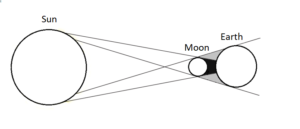The first philosopher – Thales of Miletus
On average, 237 solar eclipses occur every century. During these events, the Moon passes between the Earth and the Sun, blocking its light and casting a shadow on the Earth.
One such eclipse occurred in 585 BCE. But what makes this eclipse more significant than others? The reason is simple: it was the first solar eclipse in recorded history to be successfully predicted.
 The person behind this prediction was Thales of Miletus (624–546 BCE)—a mathematician, astronomer, and, most importantly, a philosopher. In fact, he is regarded as the first philosopher in history.
The person behind this prediction was Thales of Miletus (624–546 BCE)—a mathematician, astronomer, and, most importantly, a philosopher. In fact, he is regarded as the first philosopher in history.
The sage from the city of Miletus, city located on the Aegean coast of Asia Minor, thus etches his name into history forever.
Information about Thales is primarily based on the writings of other philosophers and historians who documented his life and ideas. Aristotle refers to him as the “first philosopher” and provides the earliest accounts about him. Considered the founder of scientific philosophy, Thales is an undeniable figure in the formation of modern Western philosophy.
His rational approach to natural phenomena and his initial steps toward understanding the essence of the cosmos marked a turning point in the history of thought. Thales laid the foundation for a scientific perspective by separating philosophy from myths and explaining nature through observation, analysis, and logic.
By replacing mythology with rational thought, theories, and hypotheses in the analysis, observation, and study of nature and the universe, Thales laid the foundation for science—arguably humanity’s greatest achievement.
Before Socrates placed humanity at the center of the cosmos, the philosopher from Miletus and his successors established the first pillar of ancient Greek science, which is considered the core of modern science. Even Socrates could not slow this process.
Thales was the first to pose the question, “What is the fundamental substance of the universe?” He sought to understand the origin of the world—not who created it, but from what it was created. This marked the first aim of this nascent philosophy. Thales’ own answer to this question was water, or matter. At first glance, this simple answer carries profound significance. Its importance lies not in whether it is correct or incorrect but in its approach. In time, this line of thought would prove its value.
The philosopher concluded that water is the foundation of existence—he famously declared, “Water is the best.” Everything, he proposed, is composed of water. Animals are born from seeds, which are liquid in form. Thus, it is plausible to infer that all existence originated from liquid. Plants rely on moisture, and even the sun and stars are nourished by the evaporation of water.
Water changes its form easily and moves without losing its structure. The Earth rests upon water, Thales reasoned, which means that earthquakes are not caused by supernatural forces but are simply the result of waves. Of course, we now know that the Earth does not rest on water, but the beauty of this idea lies in its reliance on logic and scientific reasoning. Over 2,500 years ago, Thales’ understanding that earthquakes and other natural phenomena were not supernatural marked a significant, undeniable achievement.
Even in our modern era, there are those who see divine messages in the flight patterns of birds. The distinction between the natural and the supernatural is immeasurable. Natural phenomena can often be predicted and, in some cases, controlled. The “supernatural,” however, can only be endured. And endurance is a sign of weakness—not just physical, but intellectual as well.
As you can see, Thales lights the first torch! He seeks to understand the essence of the universe through science, avoiding the use of mythology in his explanations, such as saying “the gods created it,” as many still do today. This is precisely what makes him one of the most significant figures of his time and ancient philosophy.
A figure creates a new foundation. Every event has practical, logical, and verifiable causes, says Thales, and it has nothing to do with the gods.
The philosopher from Miletus, who discovered a method to calculate the distance from the shore to a ship, is commemorated in a geometric theorem bearing his name. Having traveled to ancient Egypt and Babylon, this philosopher introduced geometry into Greece, sparking its development there.
Thales was the first to use deduction in mathematics, establishing the practice of proving mathematical theorems before accepting their validity. Deduction is a method of reasoning from general principles to specific conclusions and is a form of logical proof. This concept can be better understood through the following example: All stars are born and eventually die. The Sun is a star. Therefore, the Sun will also perish.
According to the legend, Thales calculates the height of the Great Pyramid of Giza based on his shadow. During his journey to Egypt, the Greek philosopher sees the pyramid and is amazed by its grandeur. Thales asks the priests about the height of the pyramid. The reaction is classic: Only the Sun god knows this, they say.
Of course, this answer cannot satisfy the philosopher. I will calculate it, says Thales, and first he calculates his own shadow and discovers that its length is twice his height. Using the same method, the Greek sage applies it to the pyramid and accurately calculates its height.
The response is once again classic. The priests, enraged, demand that Thales, who possesses the knowledge of the gods, leave Egypt.
The wise philosopher, who declares that the supreme god is not knowledge, lays the foundation for the first Greek school of science and philosophy — the Milesian school. Here, the art of discussion, or debate, the study of nature, and the methods of rational inquiry are taught.
As we now understand, the gods have no place in Thales’ system of education. Thus, the philosopher separates the supernatural from science, establishes the foundation of the scientific method, creates a school of philosophy, and ultimately lays the groundwork for the first age of Enlightenment.
The scientific method encompasses analysis, experimentation, observation, deduction, and experience. This method is the central principle of modern science, creating an impenetrable barrier between science and pseudoscience.
Thales says that the hardest thing for a person is “to know oneself,” and the easiest is “to give advice to others.” When asked how a person can live a more generous life, the philosopher answers, “When we do not commit the deeds that we blame others for.” This advice is something that should certainly be taken into account even today.
The Milesian school of philosophy encompasses two other wise minds, Anaximander and Anaximenes. So, they will not escape our attention.
A careful reader should have already noticed that the philosopher of the ancient world was simultaneously a mathematician, physicist, chemist, and biologist. But why is he called a philosopher, not a scientist? The reason is very simple: modern science, or “scientia” in Latin, meaning knowledge, has not yet been established. There is no science. However, the natural philosophy that Thales and the others laid the foundation for will eventually evolve into modern science. More on this later, when the mind is sufficiently nourished!


